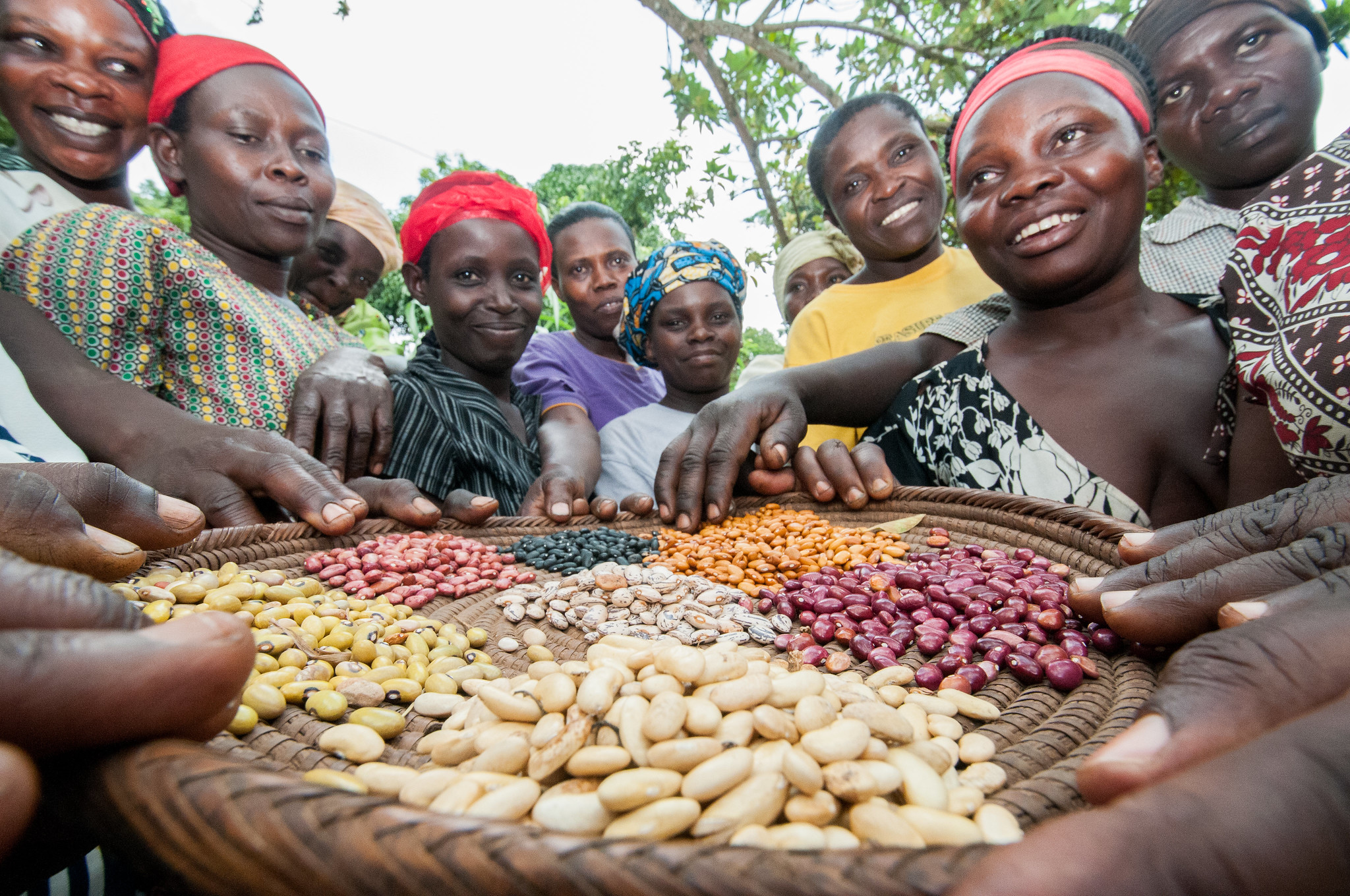Women with beans in Uganda. Photo by Flickr/Alliance of Bioversity International and licensed as CC BY-NC-SA 2.0
The Struggle to Protect Farmers’ Seed Systems
The following is a summary of a policy brief by the Institute for Agriculture and Trade Policy about the unhealthy control industrial agriculture has over family farming around the world.
In every farming community across the globe, seeds are more than a source of food. They carry stories, culture, and resilience. For centuries, smallholder farmers have saved, exchanged, and shared seeds to ensure biodiversity, adapt to changing climates, and pass on knowledge to future generations. Today, however, these practices are under severe threat.
The rise of industrial agriculture has transformed seeds into commodities controlled by powerful corporations. Instead of being a common good, seeds are increasingly governed by intellectual property rights that limit what farmers can do with them. This system undermines food sovereignty—the right of peoples to define their own food and agriculture systems—and threatens the future of agroecology, the farming approach that respects both the earth and local communities.
Seeds, Agroecology, and Farmers’ Rights
Agroecology is gaining recognition as a pathway to healthy food systems, especially due to climate change. It builds on farmers’ knowledge, promotes ecological resilience, and strengthens social equity. At its heart lies the right of farmers to “save, use, exchange, and sell” their own seeds.
The Threat of UPOV 91
The greatest challenge to farmers’ seed systems today comes from the Union for the Protection of New Varieties of Plants (UPOV) and its 1991 convention, known as UPOV 91. Originally created in the 1960s, UPOV was designed to protect plant breeders’ rights. But the 1991 revision expanded those rights dramatically, restricting farmers’ traditional practices.
UPOV 91 prohibits the exchange and sale of seeds from protected plant varieties and only allows farmers to save seeds under narrow conditions—often requiring them to pay royalties to seed companies. The U.S., in trade agreements such as the U.S.-Mexico-Canada Agreement (USMCA), pressures countries to comply.
Seeds as a Human Right
Farmers and civil society groups around the world have long opposed UPOV 91. They argue that restricting seed saving threatens the right to food. The United Nations Special Rapporteur on the Right to Food, Michael Fakhri, has affirmed that “to control seeds is to control life.”
The push for uniform commercial seeds also undermines biodiversity. When only a handful of “elite” seed varieties dominate, genetic diversity declines. This makes crops more vulnerable to pests, diseases, and climate shocks, leaving farming communities less resilient. Meanwhile, four global corporations—Bayer, BASF, Corteva, and Syngenta—control more than half the global seed market.
Alternatives That Protect Farmers
Fortunately, UPOV is not the only option. Other international agreements recognize the role of farmers as custodians of biodiversity. The International Treaty on Plant Genetic Resources for Food and Agriculture (ITPGRFA), adopted in 2001, explicitly acknowledges farmers’ contributions and upholds their rights to save, use, and exchange seeds.
Similarly, the Convention on Biological Diversity and its Nagoya Protocol stress the importance of fair and equitable sharing of genetic resources, particularly recognizing Indigenous Peoples’ traditional knowledge. More recently, the United Nations Declaration on the Rights of Indigenous Peoples (2007) and the Declaration on the Rights of Peasants (2018) affirmed that access to seeds is a matter of justice and human rights.
U.S. Pressure and the Global Struggle
Yet U.S. trade policy continues to push UPOV 91 as the global standard. Industry groups like the American Seed Trade Association work with regional bodies in Africa, Asia, and Latin America to harmonize seed laws in ways that favor corporate breeders. Countries that resist face pressure through U.S. trade reviews and special reports.
Farmers’ movements across the Global South have campaigns such as #StopUPOV to defend their seed sovereignty. They call for policies that strengthen local food systems instead of weakening them.
A Call for Solidarity
For people of faith, this struggle over seeds is not a technical matter—it is spiritual. Seeds are a sacred gift of creation, meant to be nurtured and shared, not monopolized for profit. Faith groups can call for the U.S. to stop applying UPOV 91, and instead support trade deals that uphold farmers’ rights, biodiversity, and food sovereignty.
Read the full policy brief at https://www.iatp.org/battling-for-farmers-seed-systems

